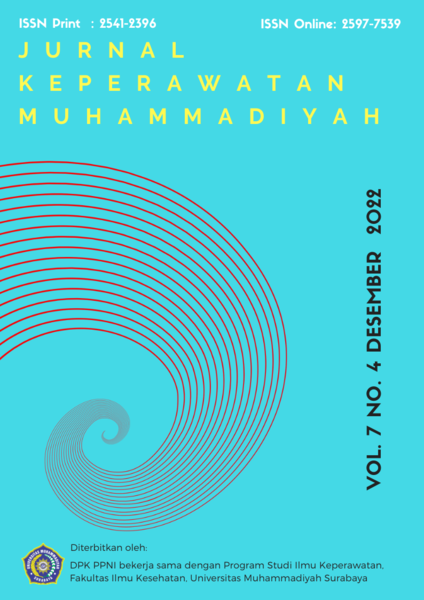Kesiapsiagaan Keluarga Pasien Yang Keluarganya Menderita Stroke Dalam Menghadapi Situasi Bencana Di Kota Ternate
DOI:
https://doi.org/10.30651/jkm.v7i4.15641Keywords:
Kesiapsiagaan keluarga, Stroke, BencanaAbstract
Background: The World Health Organization (WHO, 2016) states that there are several groups that are vulnerable when a disaster occurs, including children, pregnant women, the elderly, people with malnutrition and people with chronic diseases or immune disorders. Stroke as one of the groups affected by the disaster conditions that occurred. Stroke is a medical condition characterized by changes or neurological deficits caused by impaired blood supply to the brain, can be due to acute injury of the central nervous system (CNS) by vascular causes, including cerebral infarction, intracerebral hemorrhage and subarachnoid hemorrhage. in. Methods: This type of research is analytical descriptive with a cross sectional study approach. Result : There is still a lack of understanding of families, especially regarding aspects of actions that must be taken to anticipate disasters, not following the formulation of policies, emergency plans, disaster early warning systems, so that they do not support community preparedness.References
Ahmad SL, Fathoni M, Ahsan A. Factor Analysis Related To Family Preparedness Facing Disaster. J Ilmu Keperawatan J Nurs Sci. 2018;6(1):108–23.
Chin YY, Sakinah H, Aryati A, Hassan BM. Prevalence, risk factors and secondary prevention of stroke recurrence in eight countries from south, east and southeast asia: a scoping review. Med J Malaysia. 2018;73(2):90–9. Available from: http://www.ncbi.nlm.nih.gov/pubmed/29703872
Levac, J., Toal-Sullivan, D., & O’Sullivan TL. Household Emergency Preparedness: A Literature Review. J Community Heal. 2012;37(3):725-733.
Central Disaster Management Council (CDMC). Basic Disaster Management Plan. 2011;
Tomio, J., Sato, H., Matsuda, Y., Koga, T & Mizumura H. Household and Community Disaster Preparedness in Japanese Provincial City: A Population-Based Household Survey. Advances in Anthropology,. 2014;4:68-77.tl.
Nurhidayati I RE. Kesiapsiagaan Keluarga dengan Lanjut Usia pada Kejadian Letusan Merapi didesa Belerante Kecamatan Kemalang. J Keperawatan dan Kesehat Masy Cendekia Utama. 2018;7 No. 1 Ma.
Istianna N, Emma R. Kesiapsiagaan keluarga dengan penyakit kronis menghadapi bencana gunung berapi di Desa Sidorejo Kecamatan Kemalang Klaten. Ilm Keperawatan Indones. 2017;1(1):47–52.
Black JM, Hawks JH. Keperawatan Medikal Bedah Manajemen Klinis untuk Hasil yang Diharapkan. 8 Buku 2. Singapore: Elsevier; 2014.
Zimmermann B. H& P. Keperawatan Gawat Darurat dan bencana Sheely (A. Kurniati, Y Trisyani & S.IM Theresia, Eds). 1st ed. Singapore : Elseviers Singapore Pte Ltd; 2018.
Price Sylvia Anderson WLM. Patofisiologi (Konsep Klinis Proses-Proses Penyakit). 6th ed. Jakarta: EGC; 2015.
Albert-weissenberger C. Stroke : Pathophysiology and and Therapy. Granger DNG& J, Granger SEDNG& J, Granger SEDNG& J, editors. 2013.
Black JM, Hawks JH. Medical-Surgical Nursing: Clinical Management for Positive Outcome. 8th Editio. Singapore: Elsevier (Singapore); 2014.
International. H. Inclusive Household Disaster Preparedness Workbook. Philippines. Handicap International. 2014;
Burns N, Grove SK. Understanding Nursing Research : Building an Evidence Based Practice. 5th Editio. Vol. 11. Philadelphia: Elsevier Inc.; 2011. 592 p.
Sugiyono. Metode Penelitian : Kuantitatif, Kualitatif dan R&D. Bandung: CV. Alvabeta; 2011. 380 p.
Cheng C, Cheung S-F, Chio JH-M, Chan M-PS. Cultural meaning of perceived control: a meta-analysis of locus of control and psychological symptoms across 18 cultural regions. Psychol Bull. 2013;139(1):152–88. https://doi.org/10.1037/a0028596.
Au EWM, Savani K. Are There Advantages to Believing in Fate? The Belief in Negotiating With Fate When Faced With Constraints.
Front Psychol. 2019;10:2354. https://doi.org/10.3389/fpsyg.2019.02354.
Downloads
Published
Issue
Section
License
- Penulis tetap memegang hak atas karyanya dan memberikan hak publikasi pertama kepada jurnal ini yang secara simultan karya tersebut dilisensikan di bawah:Â Creative Commons Attribution-ShareAlike 4.0 International (CC BY-SA 4.0)













